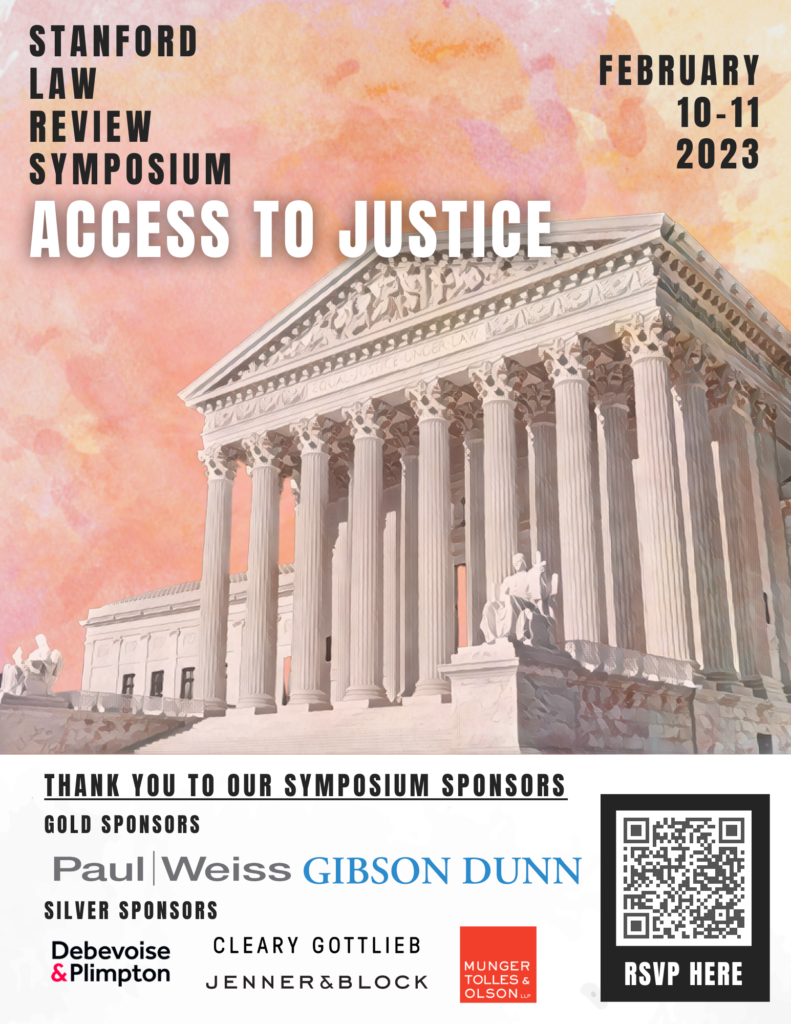- 2023 Symposium
Access to Justice
February 10-11, 2023
Register Here


Schedule
Friday, February 10, 2023
12:45 PM – 2:00 PM: Opening Keynote Lunch
Jenny S. Martinez, Dean, Stanford Law School
Nora Freeman Engstrom, Stanford Law School
Rachel Rossi, Director of Access to Justice, U.S. Department of Justice
Law School Room 190
2:15 PM – 3:30 PM: Lawyerless Courts
Law School Room 190
Essay/Presentation 1: “Lawyerless Law Development” (Shanahan, Steinberg, Mark, and Carpenter)
Essay/Presentation 2: “Should Nonlawyers be Allowed to Practice Law?” (Green)
Panel Discussants: Diego Zambrano, Stanford Law School (Moderator), Justice Melissa Hart (Colorado Supreme Court), Jim Sandman (University of Pennsylvania Law School), Judge Clemens Landau (Salt Lake City Justice Court), and JJ Prescott (University of Michigan)
3:30 PM – 3:45 PM: Coffee/Water Break
3:45 PM – 5:00 PM: Access to Housing
Law School Room 190
Essay/Presentation 1: “Lawyers Aren’t Rent” (Brodie and Bowman)
Panel Discussants: David Chiu, San Francisco City Attorney (Moderator), Rebecca Sandefur (Arizona State University), Dr. Margaret Hagan (Stanford Law School Legal Design Lab), Samira Nazem (National Center for State Courts), and Dr. Vincent Reina (University of Pennsylvania)
6:30 PM – 9:30 PM: Keynote Dinner (SOLD OUT)
Jim Sandman, President Emeritus, Legal Services Corporation
Vidalakis Hall
Saturday, February 11, 2023
8:00 AM – 8:30 AM: Breakfast
Crocker Garden
8:30 AM – 9:45 AM: Medical-Legal Partnerships
Law School Room 190
Essay/Presentation 1: “Medical-Legal Partnerships as a Model for Access to Justice” (Cannon)
Panel Discussants: David Studdert, Stanford Law School (Moderator), Dr. James Teufel (Utah Offices of Legal Services Innovation), Dr. Erin Paquette (Northwestern Feinberg School of Medicine and Pritzker School of Law), Bethany Hamilton (George Washington University), and Medha Makhlouf (Penn State Dickinson Law)
9:45 AM – 10:00 AM: Coffee/Water Break
10:00 AM – 11:15 AM: Regulatory Reform and Beyond
Law School Room 190
Essay/Presentation 1: “Monetary Sanctions Thwart Access to Justice” (Martin)
Essay/Presentation 2: “Delegalization” (Sudeall)
Panel Discussants: David Engstrom, Stanford Law School (Moderator), Dan Rodriguez (Northwestern Law School), Silvia Argueta (Legal Aid Foundation of Los Angeles), Vice Chief Justice Ann Timmer (Arizona Supreme Court), and Salena Copeland (Legal Aid Association of California)
11:30 AM – 12:45 PM: Closing Lunch and Presentation
David Freeman Engstrom, Stanford Law School
Law School Room 190
The Stanford Law Review is proud to announce its Volume 75 Symposium:
Access to Justice
2023 marks the sixtieth anniversary of Gideon v. Wainwright. It is, then, an appropriate time to take stock of the access to justice crisis in the United States. The most recent national survey, conducted by the Hague Institute for Innovation of Law, found that only 14% of civil claims “involve courts.” This indicates that 86% of Americans’ legal needs fall into a second category—they go entirely unmet. Many tenants, debtors, workers, accident victims, and others can take no action in the face of legal problems and, therefore, are entirely excluded from the civil justice system. Think here of a tenant who is living in an uninhabitable apartment and who cannot access the legal system and thus cannot induce the landlord to make necessary repairs. Like so much else, this justice gap inflicts particular damage on people of color. A 2015 ProPublica study examining debt collection judgments concluded that, “even accounting for income, the rate of judgments was twice as high in mostly [B]lack neighborhoods as it was in mostly white ones.” This symposium will nurture—and draw attention to—reformers’ disparate efforts to close this gap with a mix of theoretical, empirical, and doctrinal interventions. In 2020, the ABA adopted Resolution 115 to “encourage[] U.S. jurisdictions to consider innovative approaches to the access to justice crisis in order to help the more than 80% of people below the poverty line and the many middle-income Americans who lack meaningful access to effective civil legal services.” It is unlikely that the Supreme Court will institute a civil Gideon. But we believe we can build on Gideon to improve access to justice for generations to come.
Symposium Content
The core of the symposium will comprise a series of articles/essays to be published exploring the topic. Authors are welcome to submit their articles for print submission, but SLR will also be soliciting pieces to publish on SLRO. We plan to hold the symposium in-person, from February 10-11, 2023, featuring a host of influential scholars and practitioners.
Click here to register today.
Regards,
Amir E. Wright
Symposium Editor
Stanford Law Review | Volume 75
Anais Carell
President
Stanford Law Review | Volume 75
Past Symposia
- 2024 Symposium - Speech at Twenty-First Century Schools and Universities
- 2022 Symposium - Safeguarding the Fundamental Right to Vote
- 2021 Symposium - Policing, Race, and Power
- 2020 Symposium - Lawyering in the Age of Climate Change
- 2019 Symposium - The Independence of the American Judicial System
- 2018 Symposium - Federalism in an Age of Polarization
- 2017 Symposium - Lawyers and Leadership: Raising the Bar
- 2016 Symposium - Law of Democracy
- 2015 Symposium - Who Knows?
- 2014 Symposium - The Civil Rights Act at Fifty
- 2012 Symposium - The Privacy Paradox
- 2011 Symposium - The Future of Patents
